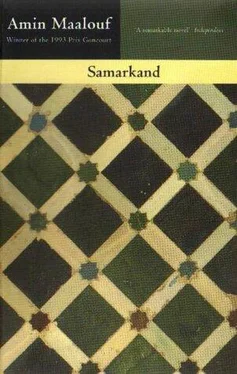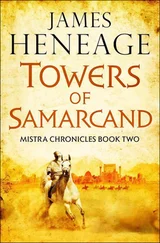It must be pointed out that he had plenty of time to do so. When I arrived in Teheran, in April 1896, the monarch was preparing to celebrate his jubilee, his fiftieth year in power. In honour of this the city was decked with the national emblem bearing the sign of the lion and the sun. Notables had come from all the provinces, numerous foreign delegations had turned up, and even though most of the official guests were lodged in villas, the two hotels for Europeans, the Albert and the Prévost, were unusually full. It was in the latter-named hotel that I finally found a room.
I had thought of going straight to Fazel, to deliver the letter to him and ask him how I could find Mirza Reza, but I was able to overcome my impatience. Not being unaware of the customs of Orientals, I knew that Jamaladin’s disciple would invite me to stay with him; I did not want to offend him by refusing but nor did I want to take the risk of being caught up in his political activity, and still less in that of his Master.
I therefore checked into the hotel Prévost, which was run by a Swiss man from Geneva. In the morning I rented an old mare so I could go to the American legation — a practical act of courtesy — on the boulevard des Ambassadeurs. Then I went to see Jamaladin’s favourite disciple. With his slender moustache, his long white tunic, the majestic way he held his head and a hint of coldness, Fazel corresponded on the whole to the image which the exile in Constantinople had drawn for me.
We were going to become best friends in the world, but the contact was distant and his direct language disturbed and upset me. Such as when we spoke of Mirza Reza:
‘I will do what I can to help you, but I do not wish to have anything to do with that madman. The Master told me that he is a living martyr. I replied: then it would be better if he were to die! Do not look at me like that, I am not a monster, but that man has suffered so much that his spirit is completely deformed; every time he opens his mouth he harms our cause.’
‘Where is he today?’
‘For weeks he has been living in the mausoleum of Shah Abdul-Azim, prowling around the gardens or in the corridors, between the buildings, speaking to people about Jamaladin’s arrest and entreating them to turn against the monarch, telling them of his own suffering, shouting and gesticulating. He never stops avowing that Sayyid Jamaladin is the Mahdi, even though he himself has forbidden him to mouth such crazed utterings. I really have no wish to be seen in his company.’
‘He is the only person who can give me information about the manuscript.’
‘I know. I shall take you to him, but I shall not stay with the two of you for a second.’
That evening a dinner was held in my honour by Fazel’s father, one of the richest men in Teheran. He was a close friend of Jamaladin and even though he kept out of any political activity he was keen to honour the Master through me; he had invited almost a hundred people. The conversation centred on Khayyam. Everyone was spouting forth quatrains and anecdotes, and there were animated discussions which sometimes veered off into politics; everyone seemed perfectly at ease in Persian, Arabic and French, and most of them could speak some Turkish, Russian and English. I felt all the more ignorant as they all considered me a great orientalist and specialist in the Rubaiyaat , which was a very great, or, I would even say, an extreme overstatement, but I had to stop contradicting it since my protests were taken as a sign of humility, which as everyone knows, is the mark of a true intellectual.
The evening began at sunset, but my host had insisted that I arrive earlier; he wanted to show me the splendours of his garden. Even if he possessed a palace, as was the case with Fazel’s father, a Persian rarely showed people around it. He would neglect it in favour of his garden, his only subject of pride.
As they arrived, the guests picked up a goblet and went off to find a place near the streams, both natural and made-made, which wound among the poplars. According to whether they preferred to sit on a carpet or a cushion, the servants would rush to place one in the chosen spot, but some perched on a rock or sat on the bare ground; the gardens of Persia do not have lawns, which in American eyes gives them a slightly barren aspect.
That night we drank within reason. The more pious stuck to tea, and to that end a gigantic samovar was carried about by three servants, two to hold it and a third to serve the tea. Many people preferred araq, vodka or wine, but I did not observe any misbehaviour, the tipsiest being happy to hum along with the musicians who had been engaged by the master of the house — a tar player, a virtuoso on the zarb , and a flautist. Later there were dancers, who were mostly young boys. No woman was to be seen during the reception.
Dinner was served toward midnight. The whole evening we had been plied with pistachios, almonds, salted seeds and sweetmeats, the dinner being the only the final point of the ceremony. The host had the duty to delay it as long as possible, for when the main dish arrived — that evening it was a javaher pilau , a ‘jewelled rice’, the guests ate it all up in ten minutes, washed their hands and went off. Coachmen and lamp-bearers clustered around the door as we left, to collect their respective masters.
At dawn the next day, Fazel accompanied me in a coach to the gate of the sanctuary of Shah Abdul-Azim. He went in alone, to return with a man who had a disturbing appearance: he was tall but terribly thin, with a shaggy beard and his hands trembled incessantly. He was clothed in a long narrow white robe with patches on it and he was carrying a colourless and shapeless bag which contained everything he possessed in the world. In his eyes could be read all the distress of the Orient.
When he learnt that I came from Jamaladin, he fell to his knees and clutched my hand, covering it with kisses. Fazel, ill at ease, stuttered an excuse and went off.
I held out the letter from the Master to Mirza Reza. He almost snatched it from my hands, and although it comprised several pages, he read it all the way through without hurrying, forgetting completely that I was there.
I waited for him to finish before speaking to him about what interested me. But he spoke to me in a mixture of Persian and French that I had some difficulty in understanding.
‘The book is with a soldier who comes from Kirman, which is also my town. He promised to come and see me here the day after tomorrow — on Friday. I will have to give him some money. Not to buy the book back but to thank the man for returning it. Unfortunately I do not have a single coin.’
Without hesitating I took out of my pocket the gold which Jamaladin had sent for him and I added an equal sum of my own. He seemed to be satisfied by that.
‘Come back on Saturday. If God wishes, I will have the manuscript and I will hand it over to you to give to the Master in Constantinople.’
The sounds of laziness rose from the sleepy city. The dust was hot and glistened in the sunlight. It was a wholly languorous Persian day, with a meal of chicken with apricots, a cool Shiraz wine, and a siesta flat-out on the balcony of my hotel room underneath a faded sun-shade, my face covered with a damp serviette.
However, on this 1 May 1896, someone’s life was going to be ended at dusk and another would begin thereafter.
There was some furious and repeated banging on my door. I finally heard it and stretched out and jumped up bare-foot, my hair stuck together and my moustache unwaxed, wearing a loose white shirt which I had bought in town. My limp fingers fumbled with the latch. Fazel pushed the door open, pushed me out of the way to close it again and shook me by the shoulders.
Читать дальше












